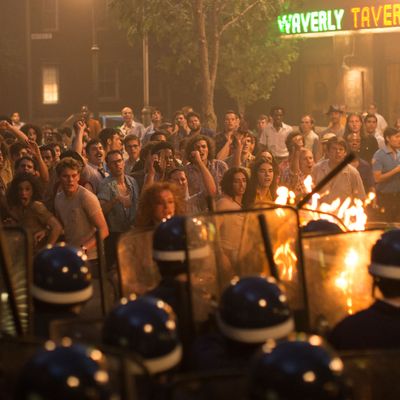
Humanity eludes Roland Emmerich, except when he’s trying to destroy it. That, more than anything else, is the great problem with Stonewall, his film about the infamous 1969 West Village uprising that marked a turning point in the LGBT-rights movement. It’s a self-financed passion project, from a man who might be the most financially successful out gay filmmaker ever. We should be celebrating this, but man, oh man, does he make it difficult.
My colleague E. Alex Jung has already discussed, compellingly, why the film’s placement of a hunky white boy at the center of events that were often driven by trans women of color, drag queens, butch lesbians, and others is troublesome, to say the least. But let’s summarize: The film follows Danny Winters (Jeremy Irvine), a young gay man from Indiana, as he arrives in Greenwich Village in 1968. He has a scholarship to Columbia, but his estranged parents back home haven’t signed his papers, so at the moment, he’s homeless and penniless. But there’s hope on Christopher Street; he cracks a smile the first time he sees two men holding hands. He’s taken in and befriended by a boisterous group of street hustlers, in particular Ray/Ramona (Jonny Beauchamp), a young, street-savvy Latina who is clearly attracted to him.
The film shows us Danny’s integration into the rough, desperate rhythms of gay life in the 1960s in the Village, including the periodic police raids that happen at the Stonewall Inn, a mafia-owned bar that’s the only place willing to serve our social-outcast heroes. (An opening title notes that at the time, it was illegal to serve drinks to homosexuals.) When the Stonewall uprising is finally instigated — surprisingly late in the film — by a particularly violent police raid, it’s Danny who throws the brick that kicks the riot off. I’m sure Emmerich thinks he’s doing the legacy of Stonewall a favor by making its instigator — its Mookie, if you will — a corn-fed ex-football player from Indiana. The director is a popular entertainer who sees his audience as big, and mainstream; he wants them to imagine themselves at the center of these events. Factual record be damned; he’s making a polemic, not a history.
Unfortunately, Roland Emmerich is a terrible filmmaker, and his efforts to make his protagonist “relatable” backfire spectacularly. The director’s inability to handle anything resembling nuance or complexity is evident in the film’s treatment of Danny, whose desperation is depicted in the broadest strokes. He might as well be called Johnny Football. For depth, we get flashbacks to his sun-dappled life in Indiana: football practice with his hard-driving father, who is also his coach; educational films at high school about the evils of homosexuality; an affair with a teammate that goes south when two friends play a practical joke on them. These are signposts, not events. (When Oliver Stone tried something similar in Born on the Fourth of July, it worked because he was presenting a dream that his young protagonist had bought into.)
To be fair, Ray even jokes about Danny’s predictably iconic upbringing when they first meet: “Let me guess, you grew up on a pea farm, kissing goats … Once you realized what you really were, you had to run away from home.” But the acknowledgement doesn’t make it any more acceptable. It’s impossible to care about Danny because at no point does he come across as a real person. Emmerich would probably describe him as an “archetype,” but a “walking cliché” would be more accurate.
Irvine has done good work in the past (sue me, I liked War Horse), but his constant bewilderment and one-note expressions of shame feel tired next to Beauchamp, who as Ray gives the film’s one genuinely excellent performance. At one point, Ray lies next to Danny and tenderly paints for him a vision of a life out West in the suburbs, where Danny would go to pharmacy school while Ray cooks and makes house. It’s the most human, touching scene in the film — and, ironically, it serves to underscore further the film’s misguided placement of the bland, one-dimensional Danny at its center.
Emmerich even fails at the parts of the film that you’d think would be second nature to him: orchestrating the chaos of the Stonewall events. But the director was never all that good at close-quarters suspense, or coordinating action in small spaces. He’s good at spectacle, and at getting a rise out of his audience at “big” moments. He has imagination and a flair for the grandiose, but no focus, no ability to bring this world to life. So when the riot comes, it feels anticlimactic. Of course, one could argue that Stonewall isn’t really about Stonewall at all. It’s about Danny’s self-actualization, about him finding himself and learning not to be afraid of his identity against a backdrop of madness, strife, and violence. Maybe that’s the film’s greatest sin: doubling down on a hollow character while turning the epochal events being depicted — and, yes, the real people involved — into an afterthought.


